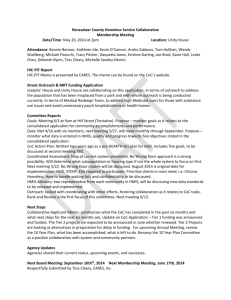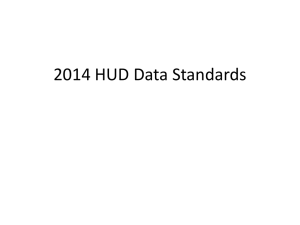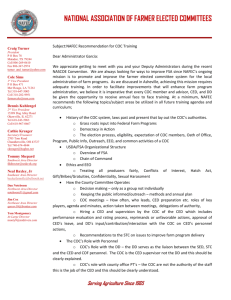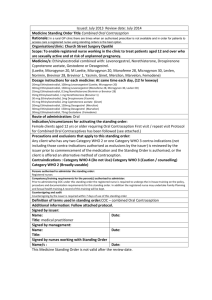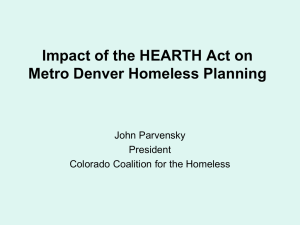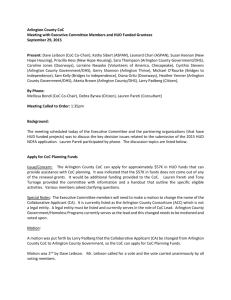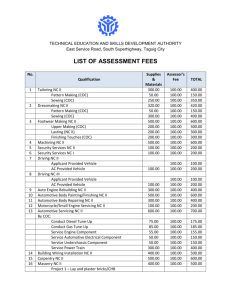SCV Math Learning Consortium Executive Summary
advertisement
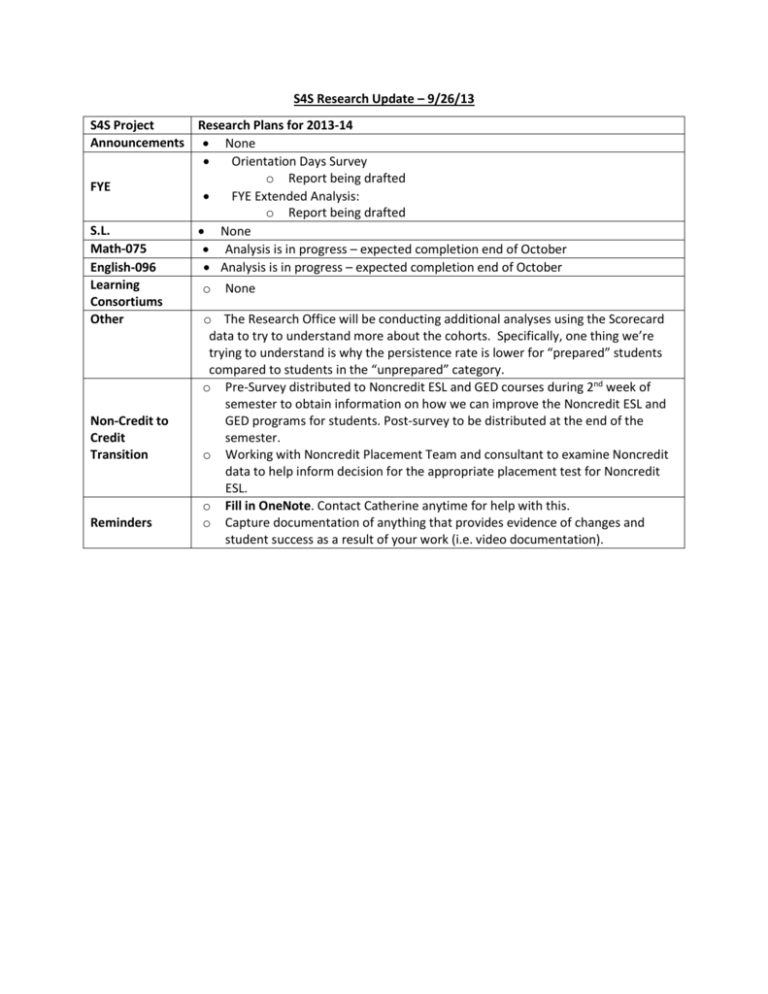
S4S Research Update – 9/26/13 S4S Project Research Plans for 2013-14 Announcements None Orientation Days Survey o Report being drafted FYE FYE Extended Analysis: o Report being drafted S.L. None Math-075 Analysis is in progress – expected completion end of October English-096 Analysis is in progress – expected completion end of October Learning o None Consortiums Other o The Research Office will be conducting additional analyses using the Scorecard data to try to understand more about the cohorts. Specifically, one thing we’re trying to understand is why the persistence rate is lower for “prepared” students compared to students in the “unprepared” category. o Pre-Survey distributed to Noncredit ESL and GED courses during 2nd week of semester to obtain information on how we can improve the Noncredit ESL and Non-Credit to GED programs for students. Post-survey to be distributed at the end of the Credit semester. Transition o Working with Noncredit Placement Team and consultant to examine Noncredit data to help inform decision for the appropriate placement test for Noncredit ESL. o Fill in OneNote. Contact Catherine anytime for help with this. Reminders o Capture documentation of anything that provides evidence of changes and student success as a result of your work (i.e. video documentation). SCV Math Learning Consortium Executive Summary September 17, 2013 4:30-6:00 in UCEN 212 Attendees: Christine Benitez(Co-Chair & Golden Valley), Collette Gibson (Co-Chair & COC), Stephanie Viramontes (Golden Valley), Will Pieleszek (Canyon), Olumuyiwa “Ayo” Idowu (West Ranch), Matt Teachout (COC), Angela Grigoryan (COC & Skills4Success), Chelley Maple (COC Student Success & Support Program). Placement into COC Math Classes: Chelley was agreeable to looking at ways to weigh completion of high school math classes with scores on the Accuplacer exam for placement into math classes. This relates to research brief #59 at COC. To follow-up with items related to placement, we need to report back on how students who participated in the Math Preparation Workshops in April 2013 performed on the math placement exam. We also need to share research brief #59 with Chelley Maple and new high school faculty joining Consortium Senior Math Class Development: Chelley suggested that as we create a senior math class, we have a pathway in mind for students to transition to COC. The pathway we will move toward is to prepare students to enter COC’s Math 075/140 path. Matt provided a good background of information for COC’s Math 075. He mentioned Carol Dweck and the growth mindset. Matt asked that the senior math class build in an arithmetic review. To prepare for future discussions: Christine will look into a class that Saugus offers. We need to find potential textbooks. Could a custom book be created where several chapters from two different books are combined? We need to know if the high school classes will have access to computers to determine if the course should be designed toward calculators only. Some high school faculty expressed interest in observing evening Math 075 classes. We should share the journal assignments from Math 075. Next Meeting: October 15, 2013 Santa Clarita Valley Learning Consortium English Meeting Minutes September 17, 2013: 4:30 – 6:00 p.m., LTLC-161 Attendees: Karen Lopez, Tracey Sherard, John Albert, Louise Davies, Victor Limon, Jennifer Putt, Mary Petersen, Andy McCutcheon, Liz Shaker, and Kari Soffa Summary: 1. The meeting opened with a presentation by Liz Shaker, COC Counselor and coordinator of the College 2 Career Day. She spoke about the efforts of the Hart District and College of the Canyons to promote college and career readiness which she said goes hand in hand with Common Core implementation. We discussed the meaning of college and career readiness and highlighted skills such as managing time, modulating emotions, asking for help, setting goals, and persisting. Liz reported that the Hart/COC leadership team, including Dave LaBaron and Audrey Green) is trying to create a Santa Clarita Valley model of 7 principles to promote college and career readiness. Liz also presented the draft copy of the Hart/COC College and Career Readiness Plan. She described the committee process of generating the grade level goals which are not yet finalized. The goal is to generate a standardized model which will be used throughout the Santa Clarita Valley and which will have measurable SLOs that will be assessed. Karen said that the focus on college and career readiness goes well with ERWC (Expository Reading and Writing Course) module entitled “What’s Next” which engages students in reflection on life after high school. Karen also inquired about the number of Hart District students who enrolled in English 101 through the EAP exemption. Chelley later confirmed the number to be 41. Karen asked whether these EAP exemption students are being monitored for success and retention. Mary felt that they are as part of the EAP pilot but contact Daylene Meuschke to confirm. Kari reported on the grant funded Career Coach program that she and COC counselors are engaged in at the Hart District which also builds affective skills and career readiness. Kari also reported on the Naviance program which is also funded by a COC grant and is in its second year of implementation. High schools use this online program as a tool for course planning, and it includes college and career modules. Parents, teachers and students have access to the program. Liz added that the COC Career center offers an online program to help determine career options called “Kuder Journey.” Mary reported that there are upcoming workshops presented on college and career readiness. The Get Focused Stay Focused conference will be offered January 9 & 10 at Santa Barbara City College. The college is also offering a one day workshop in Los Angeles on October 15th. 2. The group determined that its goal for this semester is to explore this affective component of classroom pedagogy and share best practices for engaging students in activities that promote skills such as metacognition, setting goals, monitoring progress, managing time, persisting, asking for help. It will also stay abreast of Common Core implementation and monitor the college and career readiness program at the district level. Mary volunteered to share the first presentation on an affective best practice. Next meeting: October 15, 2013 Minutes respectfully submitted by Mary Petersen Skills for Success Professional Development Subcommittee Meeting Minutes 2:00-3:00 PM – Mentry Hall, 246 Thursday, October 17, 2013 Introductions/ Welcome –In attendance: Brent Riffel (History), Denee Pescarmona (Academic Affairs), Anzhela Grigoryan (Mathematics), Mary Petersen (English), Adam Kaiserman (English), Joe Gerda (Mathematics), John Makevich (Distance Learning), Adam Kempler (English), Kevin Jenkins (Graphics/Multimedia), Leslie Carr (Professional Development) Subcommittee Goals for 2013-2014 – Attendees expressed an interest in, among things, improving training, particularly for adjuncts and new faculty, breaking down silos between departments, developing new professional development FLEX opportunities, disseminating high impact practices more widely, and developing and implementing a greater S4S professional development web presence (perhaps including a twitter and resource feed). Discussion: What are your interests in terms of professional development and student success? – The 2014 S4S Symposium was discussed. Denee indicated that it will focus on completion. Possible breakout sessions were also discussed. In addition, Denee described the potential for state funding models based on completion that may be implemented by 2017. The future of the Skilled Teacher Certificate and the Associate Program was discussed and several expressed an interest in reviving elements of the latter. Joe mentioned the need to prioritize professional development ideas to make improvements for the greatest number of students. A debate over whether to focus on one or two basic approaches or instead developm a more varied approach ensued as well. Faculty Inquiry Groups (FIG) – The committee discussed Faculty Inquiry Groups and considered the possibility of forming them to research and roll out practices from which students and faculty would benefit. A two-page handout that describes the basic function of FIGs was distributed. Mary raised the issue of whether FIGs needed to “reinvent the wheel” in terms of research, and Denee responded by saying that the need for research was more connected to how to roll out, for example, acceleration or reading across the curriculum, more than the need to conduct a literature review. Next Meeting – A meeting request will be sent out for the next meeting: Thursday, November 21, 2:00-3:00 PM.
